George is never so happy as when he is on grandpa's knee; and the first thing that grandpa has to do, when little George is seated there, is to pull out his watch.
Project Gutenberg's The Nursery, March 1878, Vol. XXIII. No. 3, by Various
This eBook is for the use of anyone anywhere at no cost and with
almost no restrictions whatsoever. You may copy it, give it away or
re-use it under the terms of the Project Gutenberg License included
with this eBook or online at www.gutenberg.org
Title: The Nursery, March 1878, Vol. XXIII. No. 3
A Monthly Magazine for Youngest Readers
Author: Various
Release Date: February 20, 2009 [EBook #28142]
Language: English
Character set encoding: ISO-8859-1
*** START OF THIS PROJECT GUTENBERG EBOOK THE NURSERY, MARCH 1878 ***
Produced by Emmy, Juliet Sutherland and the Online
Distributed Proofreading Team at http://www.pgdp.net. Music
by Linda Cantoni.
| PAGE | |
| In the Swing | 67 |
| How My Boys Helped Their Mother | 69 |
| "Stop That Quarrelling." | 71 |
| A Letter from Calcutta | 73 |
| Prairie Dogs | 75 |
| The Catbird | 79 |
| How to Draw a Cat | 80 |
| Playing Cook | 81 |
| How a Boy Caught a Fish with His Nose | 82 |
| An Old Fable | 83 |
| Our Fly | 84 |
| Grandpa's Watch | 85 |
| Helen's Bird | 87 |
| The Geese and the Hawk | 90 |
| Mabel's Secrets | 91 |
| The Snow Country | 94 |
| PAGE | |
| Nobody's Dog | 66 |
| The New Moon | 68 |
| The Girl Who is Always Good | 72 |
| The Street-Player | 77 |
| Three Little Chicks Born in a Shoe | 89 |
| The Little Student | 93 |
| The Froggie's Party (with music) | 96 |
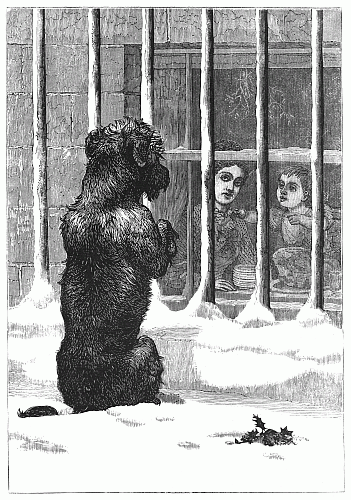 NOBODY'S DOG.
NOBODY'S DOG.
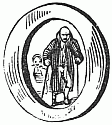
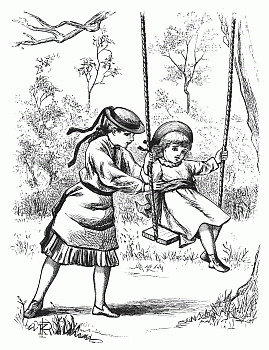
The swing was hung from an old oak-tree in grandmother's grove. There Mabel and I used to go every fine summer morning before breakfast, and swing for five minutes. We did not swing longer than that because too much of this kind of exercise is not healthy.
Once, when I had swung her very high, Mabel had a fall, but it did not hurt her, for she fell among some tufts of soft grass; but, if her head had struck a stone, it might have done her great harm. After that we were both more careful.[68]
Five years have gone by since those days. We both go to school, and I do not think you would know us, from the likenesses in the picture. But next summer we hope to visit grandmother once more, and we shall revive old times in the swing under the old oak-tree.
The sly squirrels will come out and look at us; the birds will twitter, and try to make us think that they have no nests in the trees and bushes thereabouts: but we shall say, "We shall do you no harm, birds, squirrels, beetles—no harm—for we love you all! So play on, and please let us play too."
When we first came here to live, the lot next to ours was vacant; but afterwards a house was built on it, and the boys were very much interested in the progress of the building. Often, when obliged to stay in doors, they would sit by the window, watching the work on the "new house," as they called it.
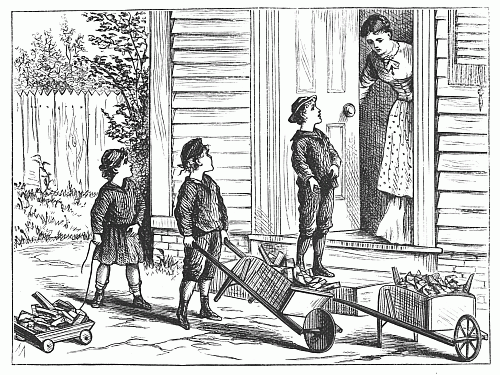
Mr. Little, the owner of the house, was an old acquaintance of ours, and very fond of children. So occasionally, when he came to oversee the work, I would allow the boys to go up and see him; and he would give them a few nails, or some blocks to play with.
One day, Mr. Little called their attention to the wood which the carpenters had thrown aside as rubbish, and told them he was going to pick up some of it, and send it home[70] to burn; "and now, boys," said Mr. Little, "if you would like to help your mother, here is a chance to get her some kindling-wood. You may come every day, and get all you can carry home."
They came home delighted with the plan; and the next morning, as soon as breakfast was done, they were ready to begin their work. The two oldest boys took their wheelbarrows, and the youngest one his cart, and off they started. I could see them from my window, working very diligently, and they soon came back, each with a good-sized load.
They knocked at the back-door, and asked me where I would have my wood put. I told them they could put it in the cellar, and opened the outside cellar-door for them. Each one threw out his load, and started for another; and so they kept at work nearly the whole forenoon.
They continued to work in this way for a week, sometimes getting one load a day, and sometimes four or five; and every night, when their papa came home, they invited him down cellar to see how much wood they had.
In a little room back of the parlor, there was an old-fashioned fireplace, in which, when the evenings began to grow cool, papa would build up a nice fire, just after supper. Then he would sit down in the firelight with the boys, and tell them stories till their bed-time, greatly to their delight.
So you see they had a reward for their labor, besides having the satisfaction of knowing that they helped their mother.
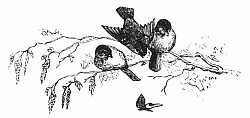
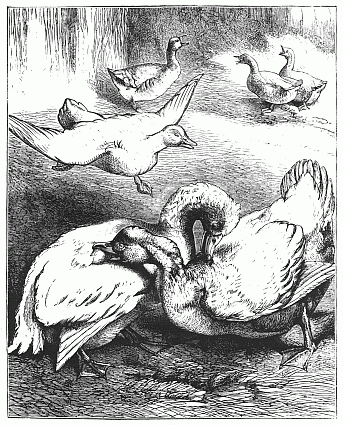
In England recently, a curious incident of geese-life was witnessed. A number of very fine geese, belonging to a Mr. Woodford were having their morning ramble, when suddenly a strange noise was heard.
Two of the geese had begun quarrelling, probably over[72] some choice morsel of food. They fought each other furiously, when they were suddenly stopped in a way that caused no little surprise to the beholders.
An old goose came flying across the road, and cackling in tones that must have meant, "Stop that quarrelling!" for they seemed to be well understood by the combatants. Having chided them well, the old goose proceeded to punish them.
Instantly the quarrelsome geese obeyed the command of the old goose; and the whole flock, that had been witnesses of the fight, began to gobble their approval of the peace that had been brought about. How much wiser they were than some bad boys, who like to see a fight, and do not try to stop it!
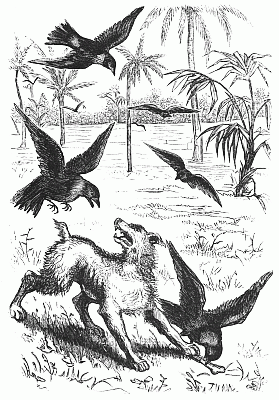
Dear "Nursery,"—Way out here, a long distance from my real home, which is not far from Boston, my grandmamma sends you; and I am so fond of hearing the stories read, that I think some of your children would like to read a story about this country.
There are many things here which would be new and strange to most of them; but few things are more funny than the crows playing their pranks. The crows are very[74] like those at home, except that these little fellows have slate-colored necks, and are much more bold.
If a window or door is left open, it will not be a minute before one or more crows will arrive and look about in search of food. If you chance to leave any thing about that is eatable, it is seized and carried off in an instant.
There is a great park here, known as the Maidan, where dogs run with bones to pick; and this habit of the dogs suits the crows perfectly, for they always try to get away the bones, and often succeed too. This is the way they usually go to work. The first crow that sees a dog with a bone calls all his friends, and off they fly to where the dog is. There they alight, and stand around him.
Then they talk to one another. Perhaps one says, in crow language, "This is an ugly cur;" another says, "He has crooked legs;" another, "His tail is cut off;" and so they keep talking until the dog gets angry, and with a snap and a bark, tries to drive them away. This only makes them laugh; and they begin again to torment the dog by talking, and even by jumping upon his back, and pulling his tail.
Now, no dog of any spirit will stand this insult. So he springs up in a rage, to punish the saucy birds. That is precisely what the crows want; for, as soon as he turns his head around to bite one crow, another darts down, seizes the bone, and carries it away. Then how they do laugh at the poor dog! and isn't he angry!
We have also a bird commonly called a "kite," but often called the "Indian swallow," as it sails about in the air just as our home swallows do. It does not seize its food with its bill, as the crow does, but with its claws or talons, and eats as it flies. Now, the crow can't help tormenting something; and the kite often gets his share of their attention.[75]
I have seen crows sit on a fence on both sides of a kite, and provoke him by their talk, just as one boy often provokes another by saying saucy little things. At first the kite pretends not to care; but very soon his feathers ruffle, and he flies at a crow, as if to tear him in pieces. The crow is quick and darts away, but returns just as soon as the kite flies at another crow. And in this way the crows amuse themselves for a long time.
It is believed here that crows hold meetings, and decide upon the punishment due to other crows that have been bad; for they have often been seen to gather in large numbers, and, after chattering like magpies for a time, take one of their number, and peck him severely, sometimes even killing him.
Good-by, dear old "Nursery." Your little friend,
How many of the bright-eyed boys and girls who read "The Nursery," or hear it read, month after month, ever saw a prairie-dog village? Ah! I see several little hands up. "The Nursery" has many readers in Western Kansas; and there is the very place where prairie-dog villages are found.
I will tell you about my first visit to one of them. As we were riding over the beautiful green prairie, we came to a place dotted here and there with hillocks about a foot high, and on each sat a funny little yellow dog.
These little hills, which have a hole in the top for a door, are the houses of the prairie-dogs. They would let us come[76] quite close to them, when, with a comical squeak, intended, I suppose, for a bark, down they would go, head first, into the holes, giving their tails a "good-by" shake.
The noise they make sounds exactly like the noise made by toy-animals when you press them in your hands. Fifty prairie-dogs all barking together could not be heard very far.
On a number of the hills sat solemn old owls, trying to look very wise. Most of these owls sat perfectly still as we drove by; but I saw two or three fly slowly away, as if half asleep. I wonder if these sober old birds teach the little prairie-dogs any of their wisdom.
All the prairies in this part of Kansas are covered with a short, thick grass, called "buffalo-grass," and the dogs live on its roots. These roots are little bulbs, and make nice rich food for the funny little fellows.
A gentleman who has lived here for many years tells me that all their houses are connected underground by halls or passages, so that they can travel a mile or so without coming to the top of the ground.
Wherever you see a prairie-dog village, there you will find good water by digging a few feet. Sometimes boys capture these queer little dogs, and they become quite tame and make cunning pets.
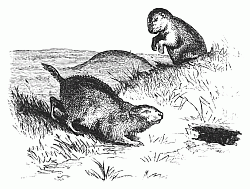
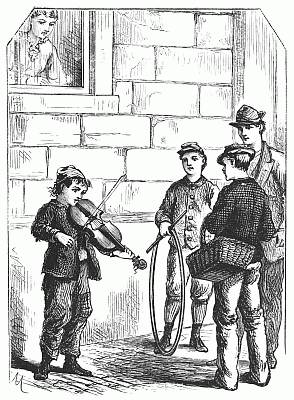
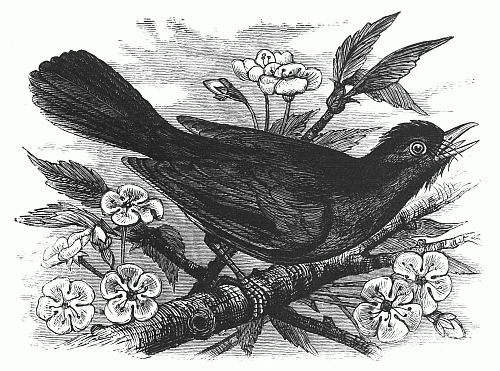
The catbird belongs to the family of thrushes, and is one of the most peculiar of our American birds. It is dark colored, with brown head and neck, and greenish-black tail. The bird is fond of society, and usually builds its nest near the dwellings of men, rather than in the quiet of the forest.
Its voice, when angry or disturbed, is harsh and shrill, but at other times, soft and sweet. It has also a cry like the mewing of a cat, from which it derives its name. It is very courageous, and will defend its young until it falls exhausted.
The catbird can be tamed, but is as mischievous as a young monkey,—meddlesome, full of curiosity, and so jealous, that it will drive any other pet bird out of the house. It dislikes to be caged, preferring the freedom of the room, so that it may look in the looking-glass, take pins off from the cushion, or perch on the plants in the window.

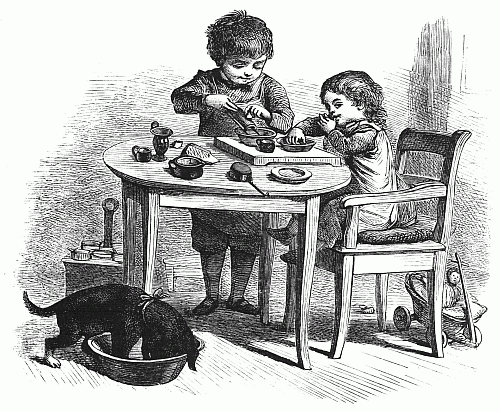
Jenny was at her little table, making a pudding for her doll's dinner, when brother Albert came in with Snap the dog, and said, "Let me be the cook, sister: I know how to make a pudding. First I will break these three eggs into the dish."
"But I can see no eggs," said Jenny.
"Look sharp," said Albert, going through the motion of breaking an egg. "Good and fresh."
"I see no eggs," said Jenny.
"You must be losing your eyesight," said the cook, taking a spoon. "Now, then, I will stir up the eggs; and now I will put in a little flour; and now I will grate in some nutmeg."
"I think you had better put in some milk," said Jenny.[82]
"Of course, I shall," replied the cook. "Where's the basin of milk?"
"You will find it on the floor," said Jenny.
Albert looked, and cried out, "Go away, Snap!—See, Jenny, that greedy dog has lapped up all the milk!"
"No matter," said Jenny. "You can get some more where you got the eggs."
So Albert seized the little pitcher, went through the motion of emptying it, stirred the pudding once more, and then placed it on the little doll-stove.
"Oh, what a fine cook you are!" said Jenny. "But, when I am very hungry, I think I shall not come to you for my dinner."
A few years ago, a little boy was out fishing with his mother, on Crooked Lake, in the western part of New York; or perhaps I should say, she was fishing, and he was looking over the side of the boat. He could see the fish darting about here and there, and liked to watch them, and he put his face as close down to the water as he could to see them more plainly.
A big trout came along, and saw something smooth and round and white close to the top of the water. It was the boy's nose. The trout was hungry, and I suppose he thought it was a piece of meat, or something else good to eat: so he gave a spring out of the lake, and caught fast hold of it with his teeth.
Very much startled, the boy jerked his head back suddenly,[83] and landed Mr. Trout in the boat. He was a fine large fellow, and weighed several pounds. I hope he did not bite off the end of the boy's nose. I wonder if the boy would like to try to catch another trout in the same way.
Everybody thought this so funny, that the boy became, for a while, quite famous, and had his photograph taken, with the mark of the bite on his nose. This may seem a very tough story, but it is true. The thing took place only a few miles from where I live.
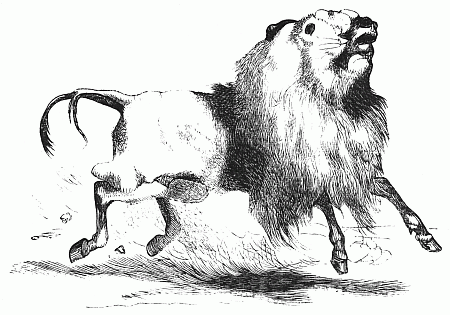
An ass, having put on a lion's skin, roamed about in the forest, and amused himself by frightening all the animals he met with in his wanderings. At last he met a fox, and tried to frighten him also; but the fox no sooner heard the sound of his voice than he exclaimed, "I might have been afraid, if I had not heard you bray."[84]
This fable was written by Æsop, a famous Grecian who lived nearly three thousand years ago.
A fable is a fictitious story designed to enforce some useful lesson or moral. See if you can tell the moral of this one.
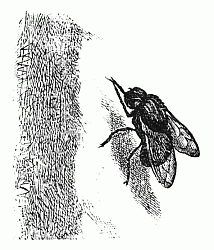
I want to tell "The Nursery" readers about a fly who has lived in my mamma's room all winter. At night he hides away in some warm place; but, when the sun shines, he flies all about the room, and acts as if he were very happy.
When my mamma was sick, he used to fly about her, and make a great buzzing; and, when the girl brought up her dinner, he would crawl about the tray as if he were hungry. Mamma would give him some sugar, which he liked very much.
We missed him once for a whole week. We looked all over the room, but could not find him anywhere. At last, one day, we saw him on the window trying to fly, and what do you think? The poor fellow had lost one of his wings. Mamma said that he must have flown into the gas-light, and got burnt. She gave him some sugar, and he seemed to feel better for eating it.
I watched him a long time, and when he had eaten enough he crawled on to my hand. I took him off, and put him on the window again; but he kept coming back to my hand, and I think, if he could have spoken, he would have said, "Thank you, little girl, for my nice dinner."
I will tell you more about him some time.
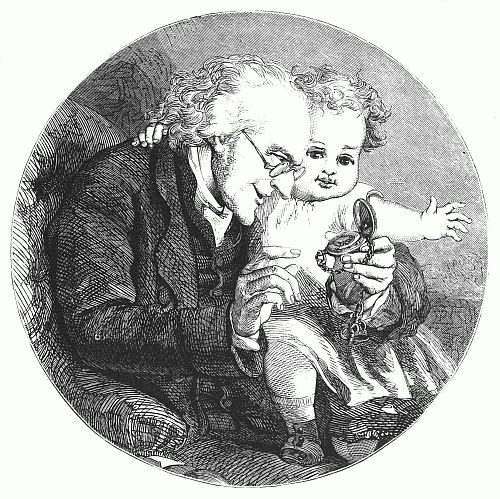
George is never so happy as when he is on grandpa's knee; and the first thing that grandpa has to do, when little George is seated there, is to pull out his watch.
"Watch, watch!" cries little George; and grandpa takes it out, opens it, and lets him see all the queer little wheels and the bright works, that shine and glitter so, and keep up the quick movements, and make the watch say, "Tick, tick!"
Grandpa and George are good friends, because grandpa tries to explain things to him. One day he brought home a watch and gave it to the little boy for his own, and showed him how to wind it up, and make it tick.
George is very proud of it, and will soon learn to tell the time of day. He knows now how to count ten.
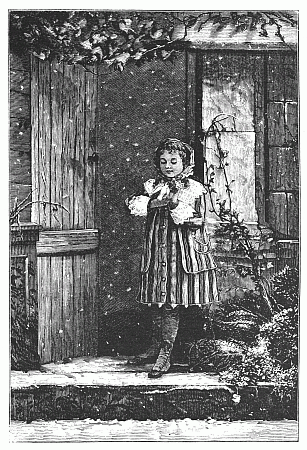
When Helen was eight years old, a pretty little canary-bird was given to her as a birthday present. She named it "Chirp;" and she and Chirp soon got to be very fond of each other.
Helen took the whole care of him; and he grew so tame[88] that he would perch on her hand, and take seeds from her finger, and even from her lips. He was a fine singer, and Helen liked to be waked in the morning by his music.
His cage was placed on her table near her bed, and she always began the day by having a little talk with Chirp. There was not the least risk in opening the cage, and letting him out into the room; for he would fly to Helen as soon as she called him.
So for years the little bird and the little girl lived happily together. One November day, when Helen was almost eleven years old, she had been out making a call, and, on her return, Chirp was missing. Helen saw that a window had been left open, and knew that he must have flown out.
"Oh, dear!" said she, in great distress, "my poor little Chirp is gone, and I shall never see him again."
Her mother tried to comfort her by saying that he had not been gone long, and could not be far away. "But," said Helen, "it is cold weather, and is snowing too, and he must be chilled to death."
However, without wasting time in talk, she snatched up a handful of canary-seed, and ran out of doors at once in search of her little pet. She looked up into the vine that grew on the side of the house, and called, "Chirp, Chirp!"
She could see nothing of him; but Chirp saw her, and in a moment came fluttering down among the snowflakes, and perched upon her hand. Oh, how delighted Helen was to see him! The first thing she did was to give him some seeds to eat; for she knew he must be half starved.
"You dear little venturesome thing," she said. "You wanted to see the world, didn't you? But why couldn't you wait for warmer weather? You have given me a dreadful fright. Come into the house now and be contented, and next summer you shall go out with me."
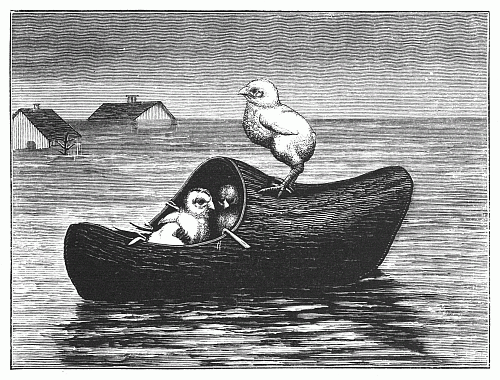
One day in May as Charles walked through the fields, he saw a large hawk hovering in the air, and heard a noise as of geese cackling. Soon an old mother-goose with a troop of little ones came running towards him.
She knew that Charles would protect her and her fledglings from the cruel hawk; and she was not mistaken. He took up a stick, and, looking up at the hawk, said, "Now come on if you dare, you old thief!"
The hawk made a swoop down to the top of a tree near by, caught sight of the goslings, and would, no doubt, have liked to clutch one of them, and carry it off; but the robber-bird was not quite bold enough to do this while Charles stood by.
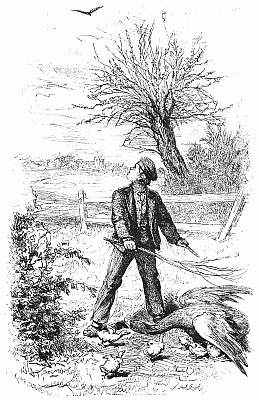
At last the hawk flew off out of sight, and Charles called his good dog Fido, and pointed at the geese, and said, "Take care of them, sir." So Fido sat down near by, and[91] watched the geese. I think if the hawk had come then, Fido would have been more than a match for him.
And what were her secrets? She was one of the children allowed to make Christmas-gifts to their friends.
But it was hard for Mabel to keep her secrets. When her papa came home at night, she always climbed upon his knee to tell him every thing that had happened in her little world during the day; and her papa always listened to her prattle with a great deal of interest.
Now, that there was something she must not tell, Mabel could think of nothing else. She climbed upon his knee, and sat so silent, that her papa said, "Well, puss, have you nothing to tell papa to-night?"
"Oh, I mustn't tell you my secrets, papa," said wise little Mabel: "I've lots of 'em, and one is for you; and, if I tell, you will know all about it."
Now that the ice was broken, Mabel chatted on, innocently thinking that her secrets were safe in her wise little head. "Mamma knows," she continued; "but you mustn't know; and we are going to have a Christmas-tree to put 'em on, and everybody will be so sprised."
Sure enough, when Christmas Eve came, every one was surprised, but, most of all, little Mabel; for a beautiful doll and many other pretty things hung upon the tree for her. "Why, mamma," she exclaimed, "somebody else must have had secrets too!"
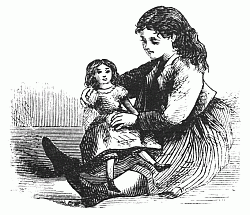
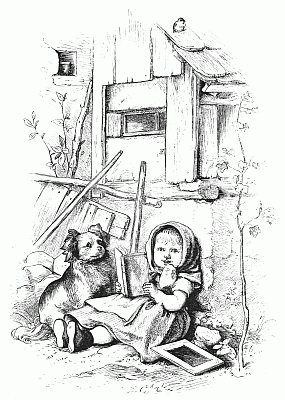
"What a funny looking man!" cried Harry, running to me with his book open, to show me a picture. "Where does he live, aunty? and why does he wear such clothes?"
"He is an Esquimau, and lives in the snow-country, and his clothes are made of fur."
"Tell me about the snow-country, aunty."
"Up in the far north, near the north pole, it is winter all the time. There the snow is always on the ground; and instead of having, as we do, many days and nights, they have only one day and one night in all the year.
"You will wonder if the people sleep all through the long night, and if they do not get tired of the long day. No; for they go to bed and get up about as often as we do.
"During the night they have the stars to light them, and bright flashing colors in the sky, such as we call the 'Northern Lights.' When the sun comes back, he makes[95] them a long visit; but never gets so high in the sky as he does with us, and never makes the weather warm."
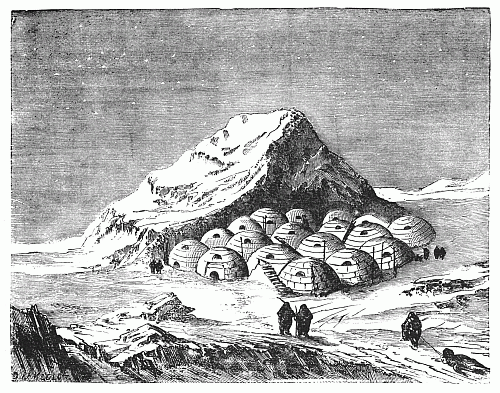
"What are those things in the picture that look like bee-hives?" said Harry.
"The picture shows you an Esquimaux village, and those are the houses. They are made of blocks of snow. Some of the houses have pieces of clear ice for windows. Others have no windows at all; only a small hole for a door, which is closed up with snow after the family have all gone in."
"A snow-house with ice windows!" said Harry. "Why, how do they keep warm?"
"They warm the houses with oil lamps, and get them very warm and very smoky too."
"Well," said Harry, "the Esquimaux are a queer people. I should like to hear more about them."
"I will tell you more some other time."
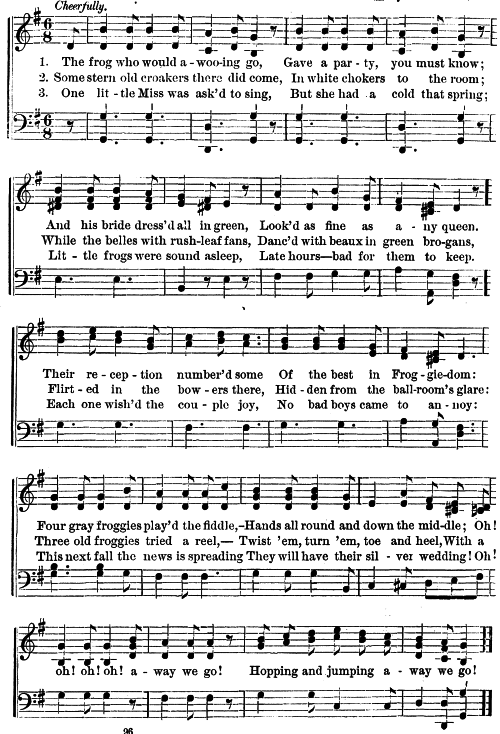
The title page and table of contents were created for this issue following the pattern from the 1877 issues.
Page 70, period added at end of paragraph (a good-sized load)
Page 75, extra comma removed. Original read (crow, is quick)
Page 95, single quotation mark changed to double quotation mark (more about them.")
On the midi, bar 6, bass staff, both notes changed to D-sharps.
End of the Project Gutenberg EBook of The Nursery, March 1878, Vol. XXIII.
No. 3, by Various
*** END OF THIS PROJECT GUTENBERG EBOOK THE NURSERY, MARCH 1878 ***
***** This file should be named 28142-h.htm or 28142-h.zip *****
This and all associated files of various formats will be found in:
http://www.gutenberg.org/2/8/1/4/28142/
Produced by Emmy, Juliet Sutherland and the Online
Distributed Proofreading Team at http://www.pgdp.net. Music
by Linda Cantoni.
Updated editions will replace the previous one--the old editions
will be renamed.
Creating the works from public domain print editions means that no
one owns a United States copyright in these works, so the Foundation
(and you!) can copy and distribute it in the United States without
permission and without paying copyright royalties. Special rules,
set forth in the General Terms of Use part of this license, apply to
copying and distributing Project Gutenberg-tm electronic works to
protect the PROJECT GUTENBERG-tm concept and trademark. Project
Gutenberg is a registered trademark, and may not be used if you
charge for the eBooks, unless you receive specific permission. If you
do not charge anything for copies of this eBook, complying with the
rules is very easy. You may use this eBook for nearly any purpose
such as creation of derivative works, reports, performances and
research. They may be modified and printed and given away--you may do
practically ANYTHING with public domain eBooks. Redistribution is
subject to the trademark license, especially commercial
redistribution.
*** START: FULL LICENSE ***
THE FULL PROJECT GUTENBERG LICENSE
PLEASE READ THIS BEFORE YOU DISTRIBUTE OR USE THIS WORK
To protect the Project Gutenberg-tm mission of promoting the free
distribution of electronic works, by using or distributing this work
(or any other work associated in any way with the phrase "Project
Gutenberg"), you agree to comply with all the terms of the Full Project
Gutenberg-tm License (available with this file or online at
http://gutenberg.org/license).
Section 1. General Terms of Use and Redistributing Project Gutenberg-tm
electronic works
1.A. By reading or using any part of this Project Gutenberg-tm
electronic work, you indicate that you have read, understand, agree to
and accept all the terms of this license and intellectual property
(trademark/copyright) agreement. If you do not agree to abide by all
the terms of this agreement, you must cease using and return or destroy
all copies of Project Gutenberg-tm electronic works in your possession.
If you paid a fee for obtaining a copy of or access to a Project
Gutenberg-tm electronic work and you do not agree to be bound by the
terms of this agreement, you may obtain a refund from the person or
entity to whom you paid the fee as set forth in paragraph 1.E.8.
1.B. "Project Gutenberg" is a registered trademark. It may only be
used on or associated in any way with an electronic work by people who
agree to be bound by the terms of this agreement. There are a few
things that you can do with most Project Gutenberg-tm electronic works
even without complying with the full terms of this agreement. See
paragraph 1.C below. There are a lot of things you can do with Project
Gutenberg-tm electronic works if you follow the terms of this agreement
and help preserve free future access to Project Gutenberg-tm electronic
works. See paragraph 1.E below.
1.C. The Project Gutenberg Literary Archive Foundation ("the Foundation"
or PGLAF), owns a compilation copyright in the collection of Project
Gutenberg-tm electronic works. Nearly all the individual works in the
collection are in the public domain in the United States. If an
individual work is in the public domain in the United States and you are
located in the United States, we do not claim a right to prevent you from
copying, distributing, performing, displaying or creating derivative
works based on the work as long as all references to Project Gutenberg
are removed. Of course, we hope that you will support the Project
Gutenberg-tm mission of promoting free access to electronic works by
freely sharing Project Gutenberg-tm works in compliance with the terms of
this agreement for keeping the Project Gutenberg-tm name associated with
the work. You can easily comply with the terms of this agreement by
keeping this work in the same format with its attached full Project
Gutenberg-tm License when you share it without charge with others.
1.D. The copyright laws of the place where you are located also govern
what you can do with this work. Copyright laws in most countries are in
a constant state of change. If you are outside the United States, check
the laws of your country in addition to the terms of this agreement
before downloading, copying, displaying, performing, distributing or
creating derivative works based on this work or any other Project
Gutenberg-tm work. The Foundation makes no representations concerning
the copyright status of any work in any country outside the United
States.
1.E. Unless you have removed all references to Project Gutenberg:
1.E.1. The following sentence, with active links to, or other immediate
access to, the full Project Gutenberg-tm License must appear prominently
whenever any copy of a Project Gutenberg-tm work (any work on which the
phrase "Project Gutenberg" appears, or with which the phrase "Project
Gutenberg" is associated) is accessed, displayed, performed, viewed,
copied or distributed:
This eBook is for the use of anyone anywhere at no cost and with
almost no restrictions whatsoever. You may copy it, give it away or
re-use it under the terms of the Project Gutenberg License included
with this eBook or online at www.gutenberg.org
1.E.2. If an individual Project Gutenberg-tm electronic work is derived
from the public domain (does not contain a notice indicating that it is
posted with permission of the copyright holder), the work can be copied
and distributed to anyone in the United States without paying any fees
or charges. If you are redistributing or providing access to a work
with the phrase "Project Gutenberg" associated with or appearing on the
work, you must comply either with the requirements of paragraphs 1.E.1
through 1.E.7 or obtain permission for the use of the work and the
Project Gutenberg-tm trademark as set forth in paragraphs 1.E.8 or
1.E.9.
1.E.3. If an individual Project Gutenberg-tm electronic work is posted
with the permission of the copyright holder, your use and distribution
must comply with both paragraphs 1.E.1 through 1.E.7 and any additional
terms imposed by the copyright holder. Additional terms will be linked
to the Project Gutenberg-tm License for all works posted with the
permission of the copyright holder found at the beginning of this work.
1.E.4. Do not unlink or detach or remove the full Project Gutenberg-tm
License terms from this work, or any files containing a part of this
work or any other work associated with Project Gutenberg-tm.
1.E.5. Do not copy, display, perform, distribute or redistribute this
electronic work, or any part of this electronic work, without
prominently displaying the sentence set forth in paragraph 1.E.1 with
active links or immediate access to the full terms of the Project
Gutenberg-tm License.
1.E.6. You may convert to and distribute this work in any binary,
compressed, marked up, nonproprietary or proprietary form, including any
word processing or hypertext form. However, if you provide access to or
distribute copies of a Project Gutenberg-tm work in a format other than
"Plain Vanilla ASCII" or other format used in the official version
posted on the official Project Gutenberg-tm web site (www.gutenberg.org),
you must, at no additional cost, fee or expense to the user, provide a
copy, a means of exporting a copy, or a means of obtaining a copy upon
request, of the work in its original "Plain Vanilla ASCII" or other
form. Any alternate format must include the full Project Gutenberg-tm
License as specified in paragraph 1.E.1.
1.E.7. Do not charge a fee for access to, viewing, displaying,
performing, copying or distributing any Project Gutenberg-tm works
unless you comply with paragraph 1.E.8 or 1.E.9.
1.E.8. You may charge a reasonable fee for copies of or providing
access to or distributing Project Gutenberg-tm electronic works provided
that
- You pay a royalty fee of 20% of the gross profits you derive from
the use of Project Gutenberg-tm works calculated using the method
you already use to calculate your applicable taxes. The fee is
owed to the owner of the Project Gutenberg-tm trademark, but he
has agreed to donate royalties under this paragraph to the
Project Gutenberg Literary Archive Foundation. Royalty payments
must be paid within 60 days following each date on which you
prepare (or are legally required to prepare) your periodic tax
returns. Royalty payments should be clearly marked as such and
sent to the Project Gutenberg Literary Archive Foundation at the
address specified in Section 4, "Information about donations to
the Project Gutenberg Literary Archive Foundation."
- You provide a full refund of any money paid by a user who notifies
you in writing (or by e-mail) within 30 days of receipt that s/he
does not agree to the terms of the full Project Gutenberg-tm
License. You must require such a user to return or
destroy all copies of the works possessed in a physical medium
and discontinue all use of and all access to other copies of
Project Gutenberg-tm works.
- You provide, in accordance with paragraph 1.F.3, a full refund of any
money paid for a work or a replacement copy, if a defect in the
electronic work is discovered and reported to you within 90 days
of receipt of the work.
- You comply with all other terms of this agreement for free
distribution of Project Gutenberg-tm works.
1.E.9. If you wish to charge a fee or distribute a Project Gutenberg-tm
electronic work or group of works on different terms than are set
forth in this agreement, you must obtain permission in writing from
both the Project Gutenberg Literary Archive Foundation and Michael
Hart, the owner of the Project Gutenberg-tm trademark. Contact the
Foundation as set forth in Section 3 below.
1.F.
1.F.1. Project Gutenberg volunteers and employees expend considerable
effort to identify, do copyright research on, transcribe and proofread
public domain works in creating the Project Gutenberg-tm
collection. Despite these efforts, Project Gutenberg-tm electronic
works, and the medium on which they may be stored, may contain
"Defects," such as, but not limited to, incomplete, inaccurate or
corrupt data, transcription errors, a copyright or other intellectual
property infringement, a defective or damaged disk or other medium, a
computer virus, or computer codes that damage or cannot be read by
your equipment.
1.F.2. LIMITED WARRANTY, DISCLAIMER OF DAMAGES - Except for the "Right
of Replacement or Refund" described in paragraph 1.F.3, the Project
Gutenberg Literary Archive Foundation, the owner of the Project
Gutenberg-tm trademark, and any other party distributing a Project
Gutenberg-tm electronic work under this agreement, disclaim all
liability to you for damages, costs and expenses, including legal
fees. YOU AGREE THAT YOU HAVE NO REMEDIES FOR NEGLIGENCE, STRICT
LIABILITY, BREACH OF WARRANTY OR BREACH OF CONTRACT EXCEPT THOSE
PROVIDED IN PARAGRAPH F3. YOU AGREE THAT THE FOUNDATION, THE
TRADEMARK OWNER, AND ANY DISTRIBUTOR UNDER THIS AGREEMENT WILL NOT BE
LIABLE TO YOU FOR ACTUAL, DIRECT, INDIRECT, CONSEQUENTIAL, PUNITIVE OR
INCIDENTAL DAMAGES EVEN IF YOU GIVE NOTICE OF THE POSSIBILITY OF SUCH
DAMAGE.
1.F.3. LIMITED RIGHT OF REPLACEMENT OR REFUND - If you discover a
defect in this electronic work within 90 days of receiving it, you can
receive a refund of the money (if any) you paid for it by sending a
written explanation to the person you received the work from. If you
received the work on a physical medium, you must return the medium with
your written explanation. The person or entity that provided you with
the defective work may elect to provide a replacement copy in lieu of a
refund. If you received the work electronically, the person or entity
providing it to you may choose to give you a second opportunity to
receive the work electronically in lieu of a refund. If the second copy
is also defective, you may demand a refund in writing without further
opportunities to fix the problem.
1.F.4. Except for the limited right of replacement or refund set forth
in paragraph 1.F.3, this work is provided to you 'AS-IS' WITH NO OTHER
WARRANTIES OF ANY KIND, EXPRESS OR IMPLIED, INCLUDING BUT NOT LIMITED TO
WARRANTIES OF MERCHANTIBILITY OR FITNESS FOR ANY PURPOSE.
1.F.5. Some states do not allow disclaimers of certain implied
warranties or the exclusion or limitation of certain types of damages.
If any disclaimer or limitation set forth in this agreement violates the
law of the state applicable to this agreement, the agreement shall be
interpreted to make the maximum disclaimer or limitation permitted by
the applicable state law. The invalidity or unenforceability of any
provision of this agreement shall not void the remaining provisions.
1.F.6. INDEMNITY - You agree to indemnify and hold the Foundation, the
trademark owner, any agent or employee of the Foundation, anyone
providing copies of Project Gutenberg-tm electronic works in accordance
with this agreement, and any volunteers associated with the production,
promotion and distribution of Project Gutenberg-tm electronic works,
harmless from all liability, costs and expenses, including legal fees,
that arise directly or indirectly from any of the following which you do
or cause to occur: (a) distribution of this or any Project Gutenberg-tm
work, (b) alteration, modification, or additions or deletions to any
Project Gutenberg-tm work, and (c) any Defect you cause.
Section 2. Information about the Mission of Project Gutenberg-tm
Project Gutenberg-tm is synonymous with the free distribution of
electronic works in formats readable by the widest variety of computers
including obsolete, old, middle-aged and new computers. It exists
because of the efforts of hundreds of volunteers and donations from
people in all walks of life.
Volunteers and financial support to provide volunteers with the
assistance they need, are critical to reaching Project Gutenberg-tm's
goals and ensuring that the Project Gutenberg-tm collection will
remain freely available for generations to come. In 2001, the Project
Gutenberg Literary Archive Foundation was created to provide a secure
and permanent future for Project Gutenberg-tm and future generations.
To learn more about the Project Gutenberg Literary Archive Foundation
and how your efforts and donations can help, see Sections 3 and 4
and the Foundation web page at http://www.pglaf.org.
Section 3. Information about the Project Gutenberg Literary Archive
Foundation
The Project Gutenberg Literary Archive Foundation is a non profit
501(c)(3) educational corporation organized under the laws of the
state of Mississippi and granted tax exempt status by the Internal
Revenue Service. The Foundation's EIN or federal tax identification
number is 64-6221541. Its 501(c)(3) letter is posted at
http://pglaf.org/fundraising. Contributions to the Project Gutenberg
Literary Archive Foundation are tax deductible to the full extent
permitted by U.S. federal laws and your state's laws.
The Foundation's principal office is located at 4557 Melan Dr. S.
Fairbanks, AK, 99712., but its volunteers and employees are scattered
throughout numerous locations. Its business office is located at
809 North 1500 West, Salt Lake City, UT 84116, (801) 596-1887, email
[email protected]. Email contact links and up to date contact
information can be found at the Foundation's web site and official
page at http://pglaf.org
For additional contact information:
Dr. Gregory B. Newby
Chief Executive and Director
[email protected]
Section 4. Information about Donations to the Project Gutenberg
Literary Archive Foundation
Project Gutenberg-tm depends upon and cannot survive without wide
spread public support and donations to carry out its mission of
increasing the number of public domain and licensed works that can be
freely distributed in machine readable form accessible by the widest
array of equipment including outdated equipment. Many small donations
($1 to $5,000) are particularly important to maintaining tax exempt
status with the IRS.
The Foundation is committed to complying with the laws regulating
charities and charitable donations in all 50 states of the United
States. Compliance requirements are not uniform and it takes a
considerable effort, much paperwork and many fees to meet and keep up
with these requirements. We do not solicit donations in locations
where we have not received written confirmation of compliance. To
SEND DONATIONS or determine the status of compliance for any
particular state visit http://pglaf.org
While we cannot and do not solicit contributions from states where we
have not met the solicitation requirements, we know of no prohibition
against accepting unsolicited donations from donors in such states who
approach us with offers to donate.
International donations are gratefully accepted, but we cannot make
any statements concerning tax treatment of donations received from
outside the United States. U.S. laws alone swamp our small staff.
Please check the Project Gutenberg Web pages for current donation
methods and addresses. Donations are accepted in a number of other
ways including checks, online payments and credit card donations.
To donate, please visit: http://pglaf.org/donate
Section 5. General Information About Project Gutenberg-tm electronic
works.
Professor Michael S. Hart is the originator of the Project Gutenberg-tm
concept of a library of electronic works that could be freely shared
with anyone. For thirty years, he produced and distributed Project
Gutenberg-tm eBooks with only a loose network of volunteer support.
Project Gutenberg-tm eBooks are often created from several printed
editions, all of which are confirmed as Public Domain in the U.S.
unless a copyright notice is included. Thus, we do not necessarily
keep eBooks in compliance with any particular paper edition.
Most people start at our Web site which has the main PG search facility:
http://www.gutenberg.org
This Web site includes information about Project Gutenberg-tm,
including how to make donations to the Project Gutenberg Literary
Archive Foundation, how to help produce our new eBooks, and how to
subscribe to our email newsletter to hear about new eBooks.